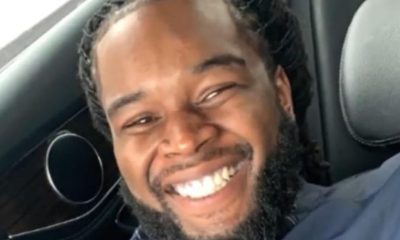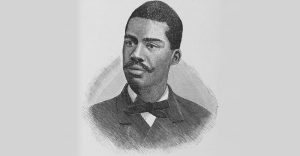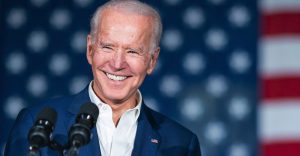Politics
Obama: ‘Now is the Moment’ for Police to Make Changes

President Barack Obama speaks during a meeting with members of the Task Force on 21st Century Policing, Monday, March 2, 2015, in the Roosevelt Room of the White House in Washington. From left are, the president, Philadelphia Police Commissioner Charles Ramsey, and Brittany Packnett, executive director of Teach For America in St. Louis, Missouri. (AP Photo/Jacquelyn Martin)
NEDRA PICKLER, Associated Press
ERIC TUCKER, Associated Press
WASHINGTON (AP) — President Barack Obama said Monday the deaths of unarmed black men in Missouri and New York show that law enforcement needs to change practices to build trust in minority communities, as a White House task force called for independent investigations when police use deadly force.
The president said last year’s deaths of Michael Brown in Ferguson, Missouri, and Eric Garner in New York City exposed “deep rooted frustration in many communities of color around the need for fair and just law enforcement.” He said a policing task force that he appointed found it’s important for law enforcement to improve training, data collection and cooperation with the communities they cover.
“The moment is now for us to make these changes,” Obama said from the White House during a meeting with members of the task force, who worked for three months to develop the recommendations. “We have a great opportunity coming out of some great conflict and tragedy to really transform how we think about community law enforcement relations so that everybody feels safer and our law enforcement officers feel — rather than being embattled — feel fully supported. We need to seize that opportunity.”
The task force made 63 recommendations after holding seven public hearings across the country that included testimony from more than 100 people. The panel also met with leaders of groups advocating for the rights of blacks, Hispanics, Asians, veterans, gays, the disabled and others.
Obama said the task force found the need for more police training to reduce bias and help officers deal with stressful situations. He recognized a particularly controversial recommendation would be the need for independent investigations in fatal police shootings.
“The importance of making sure that there’s a sense of accountability when in fact law enforcement is involved in a deadly shooting is something that I think communities across the board are going to be considering,” Obama said.
Specifically, the task force recommended external independent criminal investigations and review by outside prosecutors when police use force that results in death or anyone dies in police custody, instead of the internal investigations that are the policy of some law enforcement agencies. The task force suggested either a multi-agency probe involving state and local investigators, referring an investigation to neighboring jurisdictions or the next higher level of government. “But in order to restore and maintain trust, this independence is crucial,” the report said.
Bill Johnson, the executive director of the National Association of Police Organizations, said an outside investigation of a police-involved shooting may make sense in limited circumstances when a police department has few resources. But in the vast majority of cases, he said, it is unnecessary and perhaps even counterproductive.
“I think it helps to drive a wedge between a local police department and the community it serves — which is exactly contrary to what the intent of this police task force was supposed to be,” said Johnson, whose organization is an umbrella group of police unions. “I think it sends a message that your local police can’t be trusted.”
The task force echoed calls from officials including Attorney General Eric Holder and FBI Director James Comey for more complete record-keeping about the numbers of police-involved shootings across the country. Such data is currently reported by local law enforcement on a voluntary basis, and there is no central or reliable repository for those statistics.
“There’s no reason for us not to have this data available,” said Philadelphia Police Commissioner Charles Ramsey, a task force co-chair, who said he was surprised to learn that there were no reliable records kept. “Now that we know that this does not exist, it is our responsibility to do everything we can to develop that information.”
Ramsey also pointed out that the task force recommended decoupling immigration from local law enforcement to help improve police relationship with immigrant communities where residents may fear calling for help if they or someone in their family is in the country illegally. He said information on immigrant felons would remain available under the panel’s recommendations.
Obama earlier had called for Congress to help fund the purchase of 50,000 body cameras for police to wear and record their interactions with the public. But the task force found that the cameras raise extraordinarily complex legal and privacy issues.
“There’s been a lot of talk about body cameras as a silver bullet or a solution,” Obama said. “I think the task force concluded that there is a role for technology to play in building additional trust and accountability but it’s not a panacea. It has to be embedded in a broader change in culture and a legal framework that ensures that people’s privacy is respected.”
Laurie Robinson, a professor at George Mason University and co-chair of the task force, told reporters the type of community-police relations envisioned by the report does not happen quickly.
“It takes time, it takes relationship-building and it doesn’t happen overnight,” she said.
___
Full task force report: http://www.cops.usdoj.gov/pdf/taskforce/Interim_TF_Report.pdf
Associated Press reporters Alicia Caldwell and Darlene Superville contributed to this report.
Follow Nedra Pickler on Twitter at https://twitter.com/nedrapickler and Eric Tucker at https://twitter.com/etuckerap
Copyright 2015 The Associated Press. All rights reserved. This material may not be published, broadcast, rewritten or redistributed.
Activism
Oakland Post: Week of May 8 – 14, 2024
The printed Weekly Edition of the Oakland Post: Week of May May 8 – 14, 2024
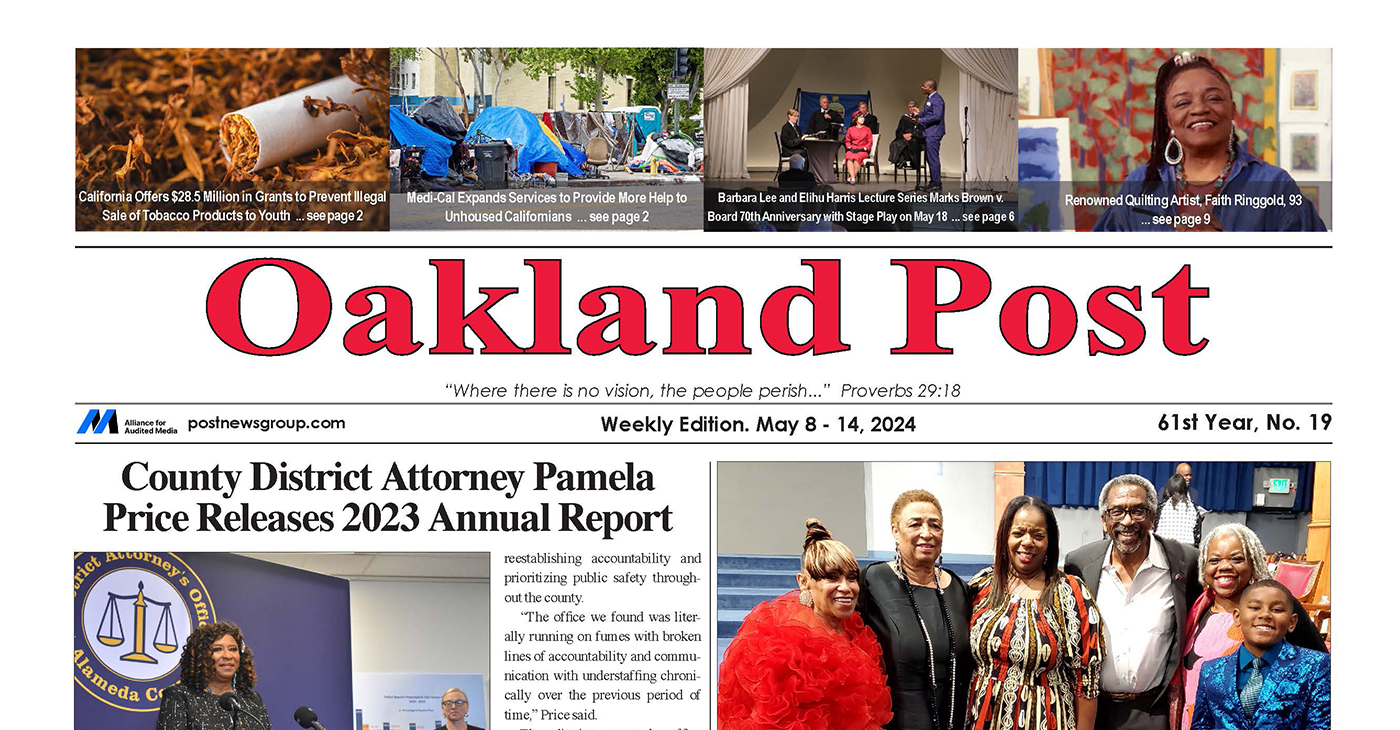
To enlarge your view of this issue, use the slider, magnifying glass icon or full page icon in the lower right corner of the browser window. ![]()
Activism
S.F. Black Leaders Rally to Protest, Discuss ‘Epidemic’ of Racial Slurs Against Black Students in SF Public School System
Parents at the meeting spoke of their children as no longer feeling safe in school because of bullying and discrimination. Parents also said that reported incidents such as racial slurs and intimidation are not dealt with to their satisfaction and feel ignored.

By Carla Thomas
San Francisco’s Third Baptist Church hosted a rally and meeting Sunday to discuss hatred toward African American students of the San Francisco Unified School District (SFUSD).
Rev. Amos C. Brown, president of the San Francisco NAACP and pastor of Third Baptist Church, along with leadership from local civil rights groups, the city’s faith-based community and Black community leadership convened at the church.
“There has been an epidemic of racial slurs and mistreatment of Black children in our public schools in the city,” said Brown. “This will not be tolerated.”
According to civil rights advocate Mattie Scott, students from elementary to high school have reported an extraordinary amount of racial slurs directed at them.
“There is a surge of overt racism in the schools, and our children should not be subjected to this,” said Scott. “Students are in school to learn, develop, and grow, not be hated on,” said Scott. “The parents of the children feel they have not received the support necessary to protect their children.”
Attendees were briefed last Friday in a meeting with SFUSD Superintendent Dr. Matt Wayne.
SFUSD states that their policies protect children and they are not at liberty to publicly discuss the issues to protect the children’s privacy.
Parents at the meeting spoke of their children as no longer feeling safe in school because of bullying and discrimination. Parents also said that reported incidents such as racial slurs and intimidation are not dealt with to their satisfaction and feel ignored.
Some parents said they have removed their students from school while other parents and community leaders called on the removal of the SFUSD superintendent, the firing of certain school principals and the need for more supportive school board members.
Community advocates discussed boycotting the schools and creating Freedom Schools led by Black leaders and educators, reassuring parents that their child’s wellbeing and education are the highest priority and youth are not to be disrupted by racism or policies that don’t support them.
Virginia Marshall, chair of the San Francisco NAACP’s education committee, offered encouragement to the parents and students in attendance while also announcing an upcoming May 14 school board meeting to demand accountability over their mistreatment.
“I’m urging anyone that cares about our students to pack the May 14 school board meeting,” said Marshall.
This resource was supported in whole or in part by funding provided by the State of California, administered by the California State Library via California Black Media as part of the Stop the Hate Program. The program is supported by partnership with California Department of Social Services and the California Commission on Asian and Pacific Islander American Affairs as part of the Stop the Hate program. To report a hate incident or hate crime and get support, go to CA vs Hate.
Alameda County
Board of Supervisors Accepts Certification of Signatures, Will Schedule Recall Election May 14
The Alameda Board of Supervisors unanimously accepted the certification of the results of the valid signatures submitted for the recall of District Attorney Pamela Price on Tuesday evening. The Board will set the election date at a special meeting on May 14. Before the meeting, recall proponents and opponents held separate press conferences to plead their cases to the Board and residents of Alameda County.
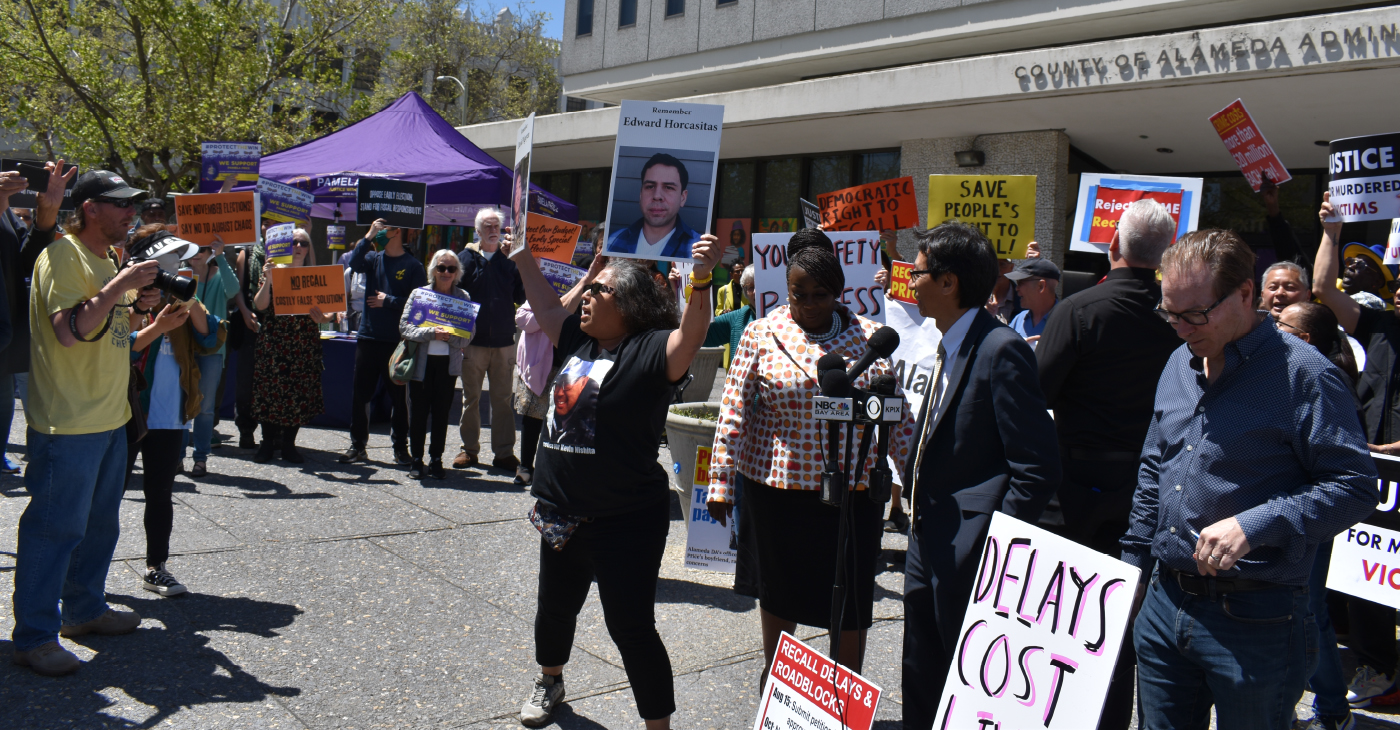
By Magaly Muñoz
The Alameda Board of Supervisors unanimously accepted the certification of the results of the valid signatures submitted for the recall of District Attorney Pamela Price on Tuesday evening. The Board will set the election date at a special meeting on May 14.
Before the meeting, recall proponents and opponents held separate press conferences to plead their cases to the Board and residents of Alameda County.
Price, who up until this point has made little public comment about the recall, held her press conference in Jack London to announce that the California Fair Political Practices Commission has opened an investigation into the finances of the Save Alameda For Everyone (SAFE) recall campaign.
The political action committee (PAC), Reviving the Bay Area, has been the largest contributor to the SAFE organization and has allegedly donated over half a million dollars to the recall efforts.
“Between September 2023 and November 2023, [Revive the Bay Area] donated approximately $578,000 to SAFE without complying with the laws that govern all political committees in California,” Price said.
Price accused the recall campaigns of using irregular signature-gathering processes, such as paying gatherers per signature, and using misleading information to get people to sign their petitions.
SAFE held their own press conference outside of the Alameda County Administration Building at 1221 Oak St. in Oakland, once again calling for the Board to certify their signatures and set a date for the recall election.
Their press conference turned contentious quickly as Price’s “Protect the Win” supporters attempted to yell over the SAFE staff and volunteers. “Stop scapegoating Price” and “Recall Price” chants went on for several moments at a time during this event.
Families of victims urged the Board to think of their loved ones whose lives are worth much more than the millions of dollars that many opponents of the recall say is too much to spend on a special election.
The Registrar of Voters (ROV) estimates the special election could cost anywhere from $15 to $20 million, an amount that is not in their budget.
The Board was presented with several options on when and how to conduct the recall election. They have to set a date no less than 88 days or more than 125 days after May 14, meaning the date could fall anywhere from late July to September.
But the County charter also states that if a general election takes place within 180 days of their scheduling deadline, the Board could choose to use the November ballot as a way to consolidate the two events.
In the event that Price is recalled, the Supervisors would appoint someone to fill the vacancy, though neither the County nor the California charter specifies how long they would have to pick a replacement.
The appointee would serve as district attorney spot until the next election in 2026. Afterwards, either they, if they run and win, or a newly elected candidate would serve the rest of Price’s six-year term until 2029. Price is unique as the only district attorney wo serves a term of six years.
The Board acknowledged that they knew last fall that this recall would come with its own set of complications when Measure B, which changed the local recall charter to match California’s, was first brought to their consideration.
Supervisors Nate Miley and David Haubert opposed discussing the measure, stating that the public would think that the Board was attempting to influence the recall campaign that had already taken off months prior.
“I think ultimately this feels like it’s going to end up in court, one way or the other, depending on who files what,” Haubert said.
Price’s legal team told the Post that the district attorney intended to consider all legal options should the recall election take place.
Miley stated that while he was in support of the amendment to the charter, he did not think it was right to schedule it for the March ballot as it would ultimately cause confusion for everyone involved.
“It has produced some legal entanglements that I think, potentially, could’ve been avoided,” Miley said.
-

 City Government2 weeks ago
City Government2 weeks agoCourt Throws Out Law That Allowed Californians to Build Duplexes, Triplexes and RDUs on Their Properties
-

 Community4 weeks ago
Community4 weeks agoFinancial Assistance Bill for Descendants of Enslaved Persons to Help Them Purchase, Own, or Maintain a Home
-

 Activism3 weeks ago
Activism3 weeks agoOakland Post: Week of April 24 – 30, 2024
-

 Community4 weeks ago
Community4 weeks agoOakland WNBA Player to be Inducted Into Hall of Fame
-

 Community4 weeks ago
Community4 weeks agoRichmond Nonprofit Helps Ex-Felons Get Back on Their Feet
-

 Community4 weeks ago
Community4 weeks agoRPAL to Rename Technology Center for Retired Police Captain Arthur Lee Johnson
-
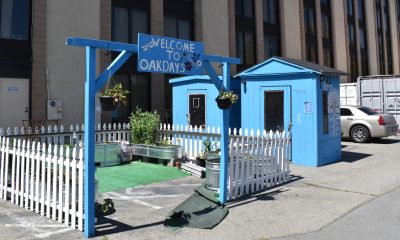
 Alameda County2 weeks ago
Alameda County2 weeks agoAn Oakland Homeless Shelter Is Showing How a Housing and Healthcare First Approach Can Work: Part 1
-

 Business4 weeks ago
Business4 weeks agoBlack Business Summit Focuses on Equity, Access and Data


